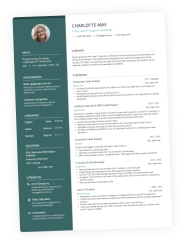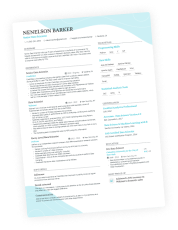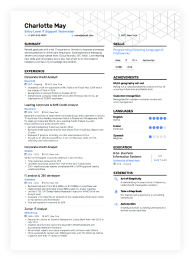When applying for a new position, employers will request you to provide a CV that will show all your experience, skills, education, and any other relevant information.
But no matter how strong you make your CV, you can always take an extra step to help your chances a little further.
A great way to do so is by providing your potential employer with a CV reference, or maybe a few.
But that might be easier said than done, as many questions might arise in your head.
We are here to help you by exploring the following questions:
- What are references on a CV?
- When should you include references on your CV?
- When shouldn’t you include references on your CV?
- How to include references on your CV?
And we are going to end strong with a great template you can use on your own CV to list all your references.
If you need some help crafting your overall CV, you might want to check out our CV Builder.
But if you are ready to learn when and how to list references on your CV, let’s begin.
Is your resume good enough?
Drop your CV here or choose a file. PDF & DOCX only. Max 2MB file size.
What are references on a CV?
The first thing we need to do is understand what are references on a CV.
References are a block of contact information for people in your CV, who the recruiter can contact to confirm information in your CV, like character, skills, and work experience.
Recruiters like using these, as a great deal of people lie on their CV.
If you provide references on your CV, the recruiter will most likely either call or email them with questions like:
- What is their relationship to you?
- Are you a good employee?
- Will you be a good fit for the job you are applying for?
- Why did you leave your job with them?
When should you include references on your CV?
There are some cases when you should list your references on your CV, and some cases when you should omit them.
Instances when you would want to include your references on your CV are:
- The employer requested it – if an employer requests a reference list from you, you should absolutely include one
- You have some great references which can help you get further in your hiring process – in that case it can only help you to list your references, which can be connected to a promotion at work, awards you received, authored or co-authored a publication, etc
- You have additional space on your CV – you can fill the empty part of your CV by adding awards or accomplishments, but if you still have some blank space, you should consider also adding in a reference list
However, if you decide to list some references, you first need to remember that they come from professionals who have an unbiased opinion of your work performance.
Some professionals to consider for your reference list are:
- Past and current employers
- Managers and team leaders
- Colleagues
- Business partners
- Coaches
- Professors
When shouldn’t you include references on your CV?
Now that you know the basics cases when you should include your references on your CV, it is time to review the opposite case – when should you omit them?
The main reasons for you to want to leave your references out of your CV are:
- You don’t have enough appropriate reference – employers use CV reference lists to double-check your abilities and qualifications with people you have worked with. But providing a list of only 2 or 3 references would not really help them with that, so you should consider leaving it out
- References are not required early in the application process – sometimes the hiring processes differ from each other, and so references might be asked from you on a next step. You might want to wait and see, and keep your reference for your interview
- You don’t have enough space on your CV – when crafting your CV, make sure you first add the most important experience, qualifications, and any sections that would help you get the job. The reference section should absolutely not take the place of a more essential one.
- References are not relevant for the job industry you are applying for – references are not applicable for every job position you apply for, so make sure you first do your research, and find out if it might be expected of you to include them
How to include references on your CV?
And if you have decided that including references on your CV would help you in the hiring process, it is essential for you to know how to do it right.
To achieve the best results, you need to follow just 5 simple steps:
- Ask permission – make sure you check with the every person you want to add to your reference list, so that you would be sure they are comfortable speaking about your professional qualifications
- Write the reference’s full name and current job title – for each entry in your references section, make sure you first write their full name, and then on the next line write their job title. Make sure you first check with each of your references on that, so that you would be sure you have an up-to-date information
- Add company and work address – on the next line, add your reference’s company name and work address. Make sure you add their work address, and not their personal one
- List your reference’s phone number and email – next, you would want to make your references easily accessible, so make sure you include their current phone number and email address
- Add a short description – finally, you would want your potential employer to know how do you know this person. Make sure you make it short, you only need to state if you were co-workers, worked on a project together, studied together, etc.
Template for listing references on your CV
And, as promised, we are going to wrap things up with a great template you can use to make it easier on yourself when listing references on your CV.
[Reference’s full name]
[Job title]
[Company name]
[Company address / Reference’s work address]
[Reference’s phone number]
[Reference’s email address]
[Short description]
Takeaways
We are all done, now you know when and how to include references on your CV.
Before you add your references section to your CV, remember to always weight whether you need it or not.
But if you decide to add it in, don’t forget to follow all the steps we shared with you:
- Ask permission from your reference to add them in
- List their full name and job title
- Add their company name and work address
- Include their phone number and email address
- End with a short description of how you know each other
Now take a look at your CV, and the industry you are applying for, and make the best of that information.



